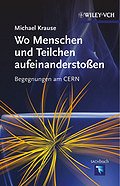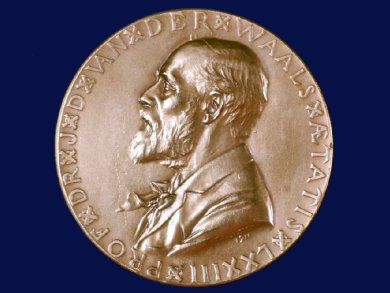The Nobel Prize in Physics for 2013 has been awarded to
- Francois Englert, Univiversity Libre de Bruxelles, Belgium, and
- Peter W. Higgs, University of Edinburgh, UK,
“for the theoretical discovery of a mechanism that contributes to our understanding of the origin of mass of subatomic particles, and which recently was confirmed through the discovery of the predicted fundamental particle, by the ATLAS and CMS experiments at CERN’s Large Hadron Collider”
Higgs and Englert together with his now deceased colleague Robert Brout proposed the theory independently of each other in 1964. In 2012, their ideas were confirmed by the discovery of a Higgs particle at the CERN laboratory in Switzerland.
François Englert, born 1932 in Belgium, studied electrical-mechanical engineering at the Université Libre de Bruxelles (ULB), Belgium, and received his PhD in physical sciences there in 1959. Until 1961, he worked at Cornell University, Ithaca, NY, USA, first as a research associate of Robert Brout and then as assistant professor. In 1980 he became a university professor at ULB and was joined there by Robert Brout to co-head the theoretical physics group. In 1984 he was first appointed as a Sackler Professor by Special Appointment in the School of Physics and Astronomy, Tel-Aviv University, Israel. Englert joined Chapman University’s Institute for Quantum Studies, University of California, USA, in 2011, where he serves as a Distinguished Visiting Professor.
Englert was awarded the 2013 Prince of Asturias Award in technical and scientific research (with Higgs and the CERN), the 2010 J. J. Sakurai Prize for Theoretical Particle Physics (with Guralnik, Hagen, Kibble, Higgs, and Brout), the Wolf Prize in Physics in 2004 (with Brout and Higgs), the High Energy and Particle Prize of the European Physical Society (with Brout and Higgs) in 1997 for the mechanism which unifies short and long range interactions by generating massive gauge vector bosons.
François Englert is best known for his contributions in statistical physics, quantum field theory, cosmology, string theory, and supergravity.
Peter Higgs, born 1929 in Newcastle, UK, studied physics at King’s College, University of London, UK, where he also obtained his PhD in 1954 for a thesis entitled ‘Some Problems in the Theory of Molecular Vibrations’. In 1954, he moved to the University of Edinburgh and remained there as a Senior Research Fellow until 1956. He then took up an ICI Research Fellowship, University of London, and then the position of Temporary Lecturer in Mathematics at University College, London. In 1960 he started a lectureship in Mathematical Physics at the Tait Institute, Edinburgh, and was promoted to Reader in 1970. In 1974 he became a Fellow of the Royal Society of Edinburgh and was promoted to a Personal Chair of Theoretical Physics in 1980. Higgs was elected Fellow of the Royal Society in 1983 and Fellow of the Institute of Physics in 1991. In 1996, he retired. Higgs is currently Professor Emeritus at the University of Edinburgh.
Higgs was awarded amongst others the the Rutherford Medalof the Institute of Physics (with Kibble) in 1984, the High Energy and Particle Physics Prize of the European Physical Society (with Brout, Englert) in 1997, the Royal Medal of the Royal Society of Edinburgh in 2000, the Wolf Prize in Physics (with Brout and Englert) in 2004, the J J Sakurai Prize of the American Physical Society (with Brout, Englert, Guralnik, Hagen and Kibble) in 2010, the Higgs Medal of the Royal Society of Edinburgh in 2012, and the Prince of Asturias Award for Technical and Scientific Researchl (with Englert and CERN) in 2013.
Peter Higgs is best known for the Higgs mechanism, which explains the origin of mass of elementary particles, in particular, of the W and Z bosons.
Publications by Higgs:
- A method for calculating thermal vibration amplitudes from spectroscopic data,

P. W. Higgs,
Acta Cryst. 1955, 8, 619–620.
DOI: 10.1107/S0365110X55001965 - Vibrational modifications of the electron distribution in molecular crystals. II. Mean square amplitudes of thermal motion,

P. W. Higgs,
Acta Cryst. 1955, 8, 99–104.
DOI: 10.1107/S0365110X5500039X - Vibrational modifications of the electron distribution in molecular crystals. I. The density in a vibrating carbon atom,

P. W. Higgs,
Acta Cryst. 1953, 6, 232–241.
DOI: 10.1107/S0365110X53000727
Also of interest:

Wo Menschen und Teilchen aufeinanderstoßen: Begegnungen am CERN
,
Michael Krause,
Wiley-VCH, Weinheim, Germany, 2013.
ISBN: 978-3527333981- Nobel Prize in Chemistry 2013
Martin Karplus, Michael Levitt, and Arieh Warshel, all USA, were awarded - Nobel Prize in Physiology or Medicine 2013
James E. Rothman, Randy W. Schekman, and Thomas C. Südhof have been awarded the 2013 Nobel Prize - Nobel Peace Prize 2013
The Organization for the Prohibition of Chemical Weapons has been awarded for its extensive efforts to eliminate chemical weapons




